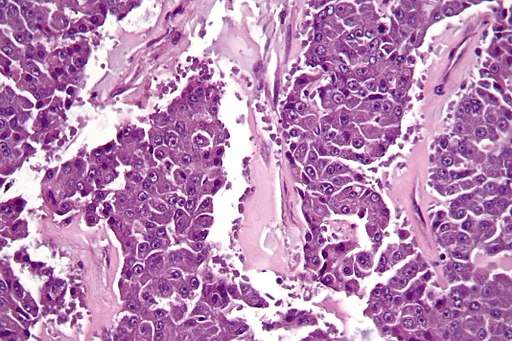
The University of Nebraska Medical Center (UNMC) has announced a partnership with biopharma firm Hemispherx to develop treatment options for pancreatic cancer.
In an upcoming study Hemispherx’s drug Ampligen, an immune-enhancing TLR3 agonist, will be investigated for its efficacy in enhancing immune responses. The drug will be administered to mice with MUC1-positive pancreatic tumours using a peptide vaccine developed by UNMC and a subsequent immune checkpoint blockade.

Discover B2B Marketing That Performs
Combine business intelligence and editorial excellence to reach engaged professionals across 36 leading media platforms.
MUC1 is an antigen involved in tumour growth and is produced by many common and often fatal cancers, including colon, breast, ovary and lung cancer.
“A prior preclinical vaccine study at UNMC using Ampligen in combination with the checkpoint blockade yielded promising results,” Hemispherx chief science officer David Strayer said.
“The objective now is to expand this experimental vaccination approach using Ampligen and a more specific antigen in combination with the checkpoint blockade. We believe these studies may yield important insights.”
“We are working hard to discover better treatments for pancreatic cancer,” said UNMC director of pancreatic cancer research Tony Hollingsworth.

US Tariffs are shifting - will you react or anticipate?
Don’t let policy changes catch you off guard. Stay proactive with real-time data and expert analysis.
By GlobalData“We believe Ampligen is an agent that holds tremendous promise–not only for pancreatic cancer, but also for a variety of other cancers.”
Hemispherx is known for its treatments targeting severely debilitating conditions. One of its best-known products is the experimental drug Ampligen (rintatolimod) for disorders of the immune system, including chronic fatigue syndrome.
UNMC is a leading pancreatic cancer research centre in the US. The centre received a five-year renewal of its $11.5m pancreatic cancer Specialized Programs of Research Excellence (SPORE) grant from the National Cancer Institute in 2014.
“We are delighted UNMC is continuing with these animal studies as part of our step-by-step progression to develop effective treatments that will prolong or possibly save the lives of people with pancreatic cancer, a devastating disease with a 5 to 6% five-year survival rate,” Hemispherx CEO Thomas K. Equels said.
“Finding a cure for this highly lethal malignancy is one of our top priorities.”
Pancreatic cancer is generally very difficult to treat as it rarely causes symptoms in its early stages so it is often detected only when it is fairly advanced. The main treatment options currently available include surgery, chemotherapy and radiotherapy. While sometimes only one form of treatment is needed, other cases require a combination of two or all three.
According to the American Cancer Society, in the US pancreatic cancer makes up around 3% of all cancers and 7% of all cancer deaths. It estimates that in 2018 around 44,330 people in the US will die of pancreatic cancer.
Pancreatic Cancer UK reported that pancreatic cancer is the third leading cause of death from cancer in the EU, following lung and colorectal cancer.





